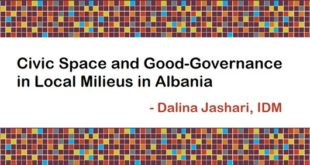*This article was firstly published at BCSDN portal on March 2018.
Author: Dalina Jashari
The role of the civil society in Albania in consolidating democracy and sustainable development has been a widespread statement among government actors and the donors’ community. As such, its role as a driving engine has been increasingly emphasized over the past years, predominantly in the frame of the country’s European integration process where enabling of a participatory approach of civil society actors in various stages of decision making has been a “task” for the state institutions. Progressively, over the last three decades, civil society actors in Albania have increased their capacities and shaped their areas of interventions particularly driven by the foreign donor funding priorities and, between advancements and setbacks, they have achieved significant impact in specific areas, such as human rights, the provision of social services to specific social groups.[1]However, this sector remains fragile in respect of the local civil society development in small/remote municipalities of the country and their impact in developing and protecting civic space, as the bedrock for an open and democratic society.[2]
While several reports have assessed the en(dis)abling environment of the Albania civil society actors, fewer analyses can be found about the extent to which initiatives from the civil society have shaped the civic space’s dimension, as well as the extent to which they have influenced and ensured its openness where multi-stakeholder cooperation must stand as the process’ key-word.
Against this background, the aim of this paper is to provide some reflections based on the experience gained from the CIVILISC project[3] which is being implemented in 12 remote/small municipalities of south-east Albania, aiming to increase capacities of local civil society actors (including non-formal citizens groups and grassroots organizations) to deal with the fight against corruption and improving local governance. Using the lessons learned from the actions supported under the sub-granting scheme of this project, this paper investigates the following questions:
What is the current state of play of local civic actors on good-governance issues at the local level?; How much capacities do local actors have to engage in the local decision-making, boost citizens participation and ensure the local ownership?; To what extent can the sub-granting mechanism reinforce civic actors in developing the civic space?
Improving Good-Governance in a Challenging Setting at the Local Level
Albania can be categorized as a country which is consolidating civic space, guaranteeing civil rights and freedoms and building a shared understanding of the genuine role of civil society actors, especially regarding the fight against corruption and improving good governance at local milieus. It displays a relatively encouraging legal setting in light of three core civil society rights: the right to freedom of association, the right to the freedom of peaceful assembly, and the right to the freedom of expression.[4] There is in place an enabling legal environment allowing civil society participation in all governance areas, such as fight against corruption, at national and local level. Namely, the Crosscutting Strategy for Decentralization and Local Governance 2014-2020[5] represents the government’s vision to strengthen local governance and democracy as well as to enhance the decentralization process. The strategy states that “The government will also encourage independent monitoring of the strategy by involving civil society organizations or international partners”. Likewise, the Crosscutting Anti-Corruption Strategy 2015-2020[6] emphasize the civil society’ role and the participation and cooperation of citizens in the decision-making process.
Several recent reports shed light on the vital role of civil society in the anti-corruption efforts, influencing public policy and pushing pressure for an accountable government, nevertheless curbing corruption requires more than just introducing well-designed laws.[7]In this context, level of preparedness and willingness of local actors (both state and non-state actors) must be considered essential in developing a civic space and empowered groups to deal with good-governance issues.
Referring to some of the civic space dimensions[8] related to the three abovementioned core rights, such as: access to information; CSOs autonomy and rights; CSO funding; citizen participation and citizen advocacy; non-discrimination/ inclusion of marginalized groups, recent records in Albania show that civil society actors at small/remote municipal level are at the very starting point of addressing these issues, thus the civic space dimension is almost inexistent or very limited.
Reasons for such undeveloped civic space can be categorized in two main categories: CSOs internal development factors such as: lack of organizational and human capacities; lack of financial sustainability due to their donor dependence; limited access to funding opportunities caused by insufficiencies in project writing as per donor’s requirements and project cycle management; limit access of non-formal citizens groups to funding opportunities due to their “unregistered” status which makes them ineligible to the donor’s requirements; lack of expert knowledge specifically on anti-corruption, good-governance issues which quell the community engagement in the design, implementation and monitoring of the anti-corruption efforts, etc. and traditional-cultural factors including: “apathy” from the CSOs and citizens which demonstrates lack of trust in the local government institutions; lack of self- awareness of CSOs on their role as watchdogs in monitoring the municipality’s activity and effectiveness; lack of voluntarism and networking and cooperation among different state and non-state actors of local community; limit focus on the legal support to informal and unregistered community groups to facilitate the court registration process, etc.
On the other side, local government units (LGUs)[9] themselves are facing a challenging momentum as regards their capacities to set up a control system and develop relevant instruments to fight against corruption as well as to establish a professional administration with relevant expert knowledge about the institutional anti-corruption framework at the local level. The deficiency of LGUs to adopt the anti-corruption measures is generally justified with the demanding challenges in the organization and functioning of the LGUs triggered by the administrative-territorial reform. Nevertheless, this new scenario in which fewer local players concentrate more power and resources substantially requires the active involvement of civil society actors.
Sub-Granting Mechanism as a “Gateway” to the Civic Engagement
Civic engagement in developing a model of good-governance at the local level is a crucial mechanism, linked to safeguarding civic space. Albania has undergone a series of reforms as regards development of the civil society sector; however, civic engagement remains weak. Citizens rarely use their “power”, particularly in small/remote areas of the country. Over the years, the foreign donor support has been the “driving engine” for the development of the civil society sector in Albania. Nevertheless, the enabling environment for the development of the civil society at local level leading to the civic engagement, so as contributing to an open civic space, has been limited and major efforts are needed in this regard. Such efforts should be two-fold: the institutionalization of cooperation between local governments and civil society actors as well as human, financial and organizational support to both formal and non-formal citizens groups to develop relevant instruments at boosting community engagement in local decision-making and governance.
Although there is a general awareness of the importance of this issue, capacity building activities on civic engagement show that local CSOs and activists lack knowledge and competencies on how to boost the community engagement within their local context. Reasons for such low and, at times, nonexistent civic engagement are different and complex, comprising social – economic factors, lack of trust in the government institutions as well as the missing culture, tradition, lack of civic education and cooperation with relevant government institutions.
Given this background, the sub-granting funding approach, which is recently applied by many donors all-over the country under the sub-granting scheme[10] has given an abundant attention to the advancement of the local government “machinery”, thus aiming to reduce the social apathy and building trust between local governments and their communities.
Between pros and cons, the sub-granting process in Albania operates under challenging circumstances in terms of ensuring the local ownership of the initiatives- this requires concrete links between both sub-grantees and the non-formal citizen’s groups. Thus, sub-granting authorities need to design solid risk management systems that need to be frequently updated in order to ensure successful project implementation and its impact. Therefore, much of the success can be achieved as a result of the appropriate combination of knowledge and experience of the “big” CSOs (as the sub-grating authority) and the beneficiaries of this scheme as “owners” of the local milieus.
In the context of the local level, this funding methodology comprises a challenging mechanism– considering that it is built on a weak civil society frame and remarkably relevant– considering its anti-corruption and good-governance related actions outside the capital. In the course of its implementation, the 25 sub-granted projects under CIVILISC Fund showed that this mechanism and its community approach might lead to a genuine civic engagement and break down communication and cooperation barriers between local government and civil society actors.
Experience so far suggests that constant support should be given to these groups, particularly focused on organizational/management support and capacity building in the field of good-governance and community engagement. This is a very delicate task, but the CIVILISC practice shows that the sub-granting implementation mechanism is contributing to achieving this objective since the sub-grants are relying on the already existing experiences and resources at ground level, which are substantial.
Interventions currently in place feature a wide-range and comprehensive activities such as capacity building activities, monitoring and assessment resource materials especially focused on the local government performance, awareness raising activities, etc.
Experience from the ground reveals that these initiatives constitute a good start for involving the active part of the society and bringing into attention accountability and community mobilization issues as important pillars contributing to the development of the local civic space. Furthermore, it shows that increasing citizens’ know-how and local administration capacities as well as pushing forward of the bottom-up approach of governance, can lead to the improved environment for civic action.
A valuable tool such as the Local Civic Advisory Commissions (LCACs) have been set up in the three small municipalities in Belsh, Cerrik and Prrenjas with the purpose to ensure representation of civil society, local stakeholders and community members in local governance decision-making as well as in monitoring of municipalities’ performance.
Shifting from Big to Small/New CSOs in Ensuring Local Ownership
At present, the CSOs’ and citizens’ impact on change at local level seems to be a difficult and a long-standing task, particularly due to the lack of civic engagement and the capacities of both state and non-state actors at the local level to deal with good-governance issues that lead to an open civic space.
A civil society organization has drafted the Transparency Program of Selenica Municipality and has carried out a series of advocacy, awareness raising campaigns on the right to information and capacity building activities for the adoption and implementation of this mechanism.
The sub-granting component applied under the CIVILISC project and its results achieved so far suggests that this funding mechanism can become, to a certain extent, vital to support local small grass-roots organizations and ensure the local ownership of the initiatives. Nevertheless, it should not be considered solely a set of re-distribution funds procedures from a well-experienced CSO to other small ones that do not have capacities to implement and manage large-scale projects. On the contrary, the approach in which support and mentoring is delivered plays an essential role in the revival of local civic actors and to the local ownership of democratic processes. As a result, the sub-granted projects can lead to the establishment of a strong local ownership of the initiatives, where more experienced CSOs cooperate with a mixture of civic/interest groups at a very local /micro level which generate relevant ideas and provide feedback for further development of the sector.
However, the cascade system from big to small CSOs involves a mid-term transfer of knowledge process, taking into consideration the legal and institutional status of an informal group of citizens that excludes them from the mainstream of available donor funding opportunities. In this shifting environment from “big” to “small” CSOs, the international donor community must take into consideration to facilitate the funding procedures for non-formal civic groups which might lead to a more dynamic interaction of citizens. In a long-term perspective, the diversification of funding mechanisms and resources should be a priority for developing sustainable local ownership of the civic actions through the involvement of the private sector, philanthropy, voluntarism, and crowdfunding.
Conclusions and Recommendations
Academic research and experience from the ground emphasize that there is a strong link between civil rights and corruption and that the citizens’ inability to hold the government accountable set path to the abuse and shrinking of the civic space. However, respecting civil rights (i.e. freedom of expression, freedom of association) cannot be considered as a sole responsibility of civic society actors. Improving good-governance can be powerful if actions from the civic actors are combined with state’s will to protect these rights, both at national and local level. Current policies and regulatory framework in Albania enable a positive setting regarding the main dimensions of civic space as well as civic participation in local governance.
In a local perspective, civic space in small/remote LGUs is characterized by deficiencies in the institutional, organizational, and human resources of both civil society and local government administration. Thus, the contribution of the civil society is essential to boost citizen’s participation, improve accountability and engaging in advocacy actions leading to the local change.
The experience from the sub-granting facility shows that it is a relevant mechanism and opportunity for supporting small/grassroots organizations which cannot participate in large-scale projects. However, this “transfer” and “facilitation” of funds from well-experienced CSOs to small ones should not be considered as an aim in itself but should remain an integral part of an action comprising permanent mentorship and capacity building actions.
Against a challenging environment at the local level, lessons suggest that international donors should apply a tailored approach to the specific needs of local communities to deal with good-governance issues. Nevertheless, while the capacity and institutional structure of small/non-formal genuine civic groups is seen as an essential pillar at improving good-governance, current funding mechanism might be considered a catalyst for establishing a genuine civil society and ensuring the local ownership of the actions. Succeeding stages should include: diversification of funds beyond the “traditional” international donors’ community and explore of new funding opportunities as well as generate innovative ideas in boosting the citizen engagement at the local level with special focus on civic education.





